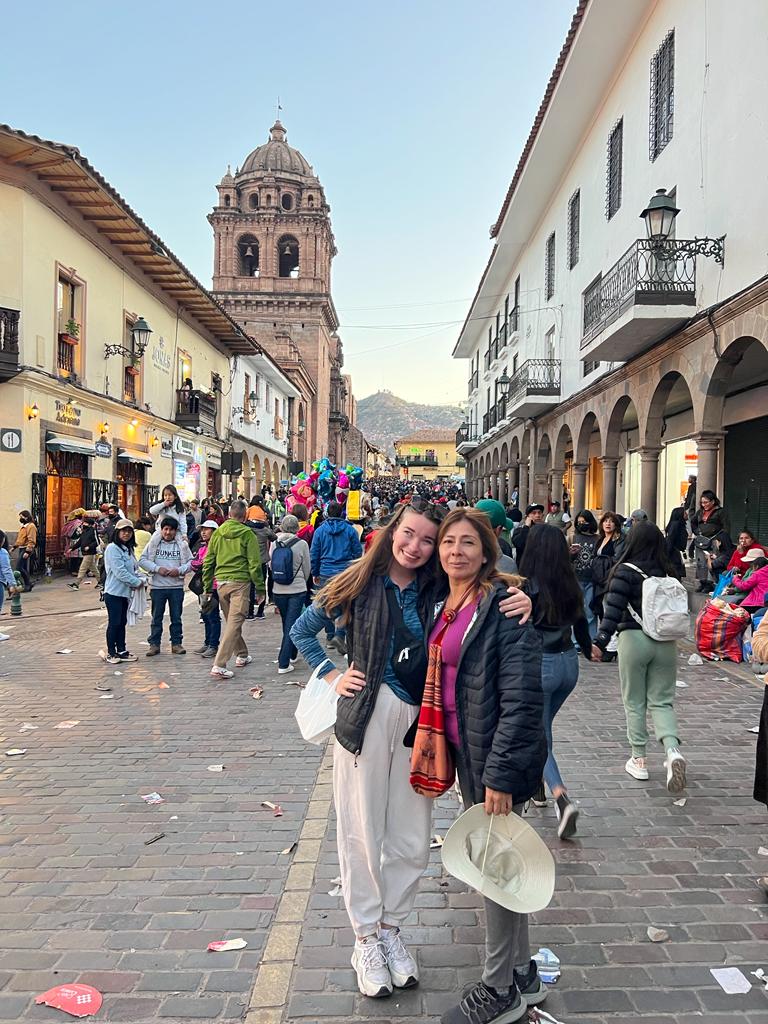Welcome to this article on the impact of cross-cultural experiences on community development! In our interconnected world, the opportunity to engage with different cultures has become more accessible than ever. Whether through travel, educational programs, or community outreach initiatives, cross-cultural experiences offer numerous benefits to individuals and communities alike.
In this article, we will explore the various aspects of cross-cultural experiences and how they contribute to community development. We will delve into the definition and importance of cross-cultural experiences, examine the benefits they bring, and discuss ways to promote cultural awareness. Furthermore, we will explore how cross-cultural experiences enhance community development by strengthening social cohesion, fostering intercultural understanding, encouraging economic growth, and addressing social issues.

We will also address the challenges that may arise during cross-cultural experiences and provide solutions to overcome them. Additionally, we will explore methods for measuring the impact of such experiences and highlight success stories and case studies. Finally, we will discuss the role of government and organizations in facilitating cross-cultural experiences and creating accessible opportunities for individuals to engage with different cultures.
By the end of this article, you will have a comprehensive understanding of the impact of cross-cultural experiences on community development, as well as the practical steps you can take to engage with other cultures and contribute to the betterment of your community. So, let’s dive in and explore this fascinating topic!
Understanding Cross-Cultural Experiences
Definition and Importance
Cross-cultural experiences refer to interactions or engagements that occur between individuals from different cultural backgrounds. These experiences can take various forms, such as traveling, living, working, or studying in a different country. They provide opportunities for individuals to learn about and appreciate diverse cultures, languages, traditions, and perspectives.
Importance of Cross-Cultural Experiences:
- Personal Growth: Engaging in cross-cultural experiences allows individuals to broaden their horizons, challenge their assumptions, and gain a deeper understanding of themselves and the world around them.
- Cultural Awareness: It helps in developing a sense of cultural empathy and understanding, fostering appreciation for diversity, and breaking down stereotypes and prejudices.
- Global Citizenship: Cross-cultural experiences contribute to the development of global citizens who can navigate and thrive in an increasingly interconnected and diverse world.
- Professional Development: In today’s globalized job market, employers value individuals with cross-cultural competencies. These experiences enhance communication skills, adaptability, problem-solving abilities, and cultural sensitivity – all of which are crucial for professional success.
Benefits of Cross-Cultural Experiences
Engaging in cross-cultural experiences offers a range of benefits that positively impact individuals and communities. Some of the key benefits include:
- Broadened Perspective: Exposure to different cultures expands an individual’s worldview, challenging preconceived notions and promoting open-mindedness.
- Increased Tolerance and Empathy: By understanding and appreciating cultural differences, individuals become more accepting, tolerant, and empathetic towards others.
- Enhanced Communication Skills: Cross-cultural experiences improve communication skills by fostering the ability to navigate language barriers, adapt to different communication styles, and listen actively.
- Cognitive Flexibility: Interacting with diverse cultures enhances cognitive flexibility, enabling individuals to think critically, solve problems creatively, and adapt to new situations.
- Cultural Competency: Developing cultural competence allows individuals to engage effectively with people from different backgrounds, demonstrating respect and understanding.
- Networking Opportunities: Cross-cultural experiences provide opportunities to build international networks, which can be valuable for personal, academic, and professional growth.
By embracing and actively seeking out cross-cultural experiences, individuals can gain invaluable skills and perspectives that ultimately contribute to their personal growth, community development, and global understanding. So, whether it’s through travel, education, or engaging with diverse communities, embracing cross-cultural experiences can be a transformative journey that opens doors to new possibilities.
Promoting Cultural Awareness
Cultural awareness plays a crucial role in fostering understanding and appreciation for different customs, traditions, and ways of life. It helps individuals develop empathy and respect for diverse cultures, which can lead to a more inclusive and harmonious society. Promoting cultural awareness is essential in today’s globalized world, where interactions between people from different backgrounds are becoming increasingly common and necessary. Here are three ways to promote cultural awareness:
Education and Cultural Exchange Programs
Education is an effective tool for promoting cultural awareness. Schools and educational institutions can incorporate multicultural curriculum and activities that expose students to different cultures. This can include learning about history, traditions, literature, and art from various countries. Additionally, cultural exchange programs provide opportunities for students to interact with individuals from different backgrounds. These programs can include study abroad experiences, international student exchanges, and cultural immersion programs. By exposing students to different ways of life, cultural exchange programs help cultivate tolerance, understanding, and respect for diverse cultures.

Engaging with Local Communities
Engaging with local communities is another powerful way to promote cultural awareness. This can be done through organizing events and activities that celebrate diversity and encourage community participation. Festivals, cultural showcases, and food fairs are excellent examples of events that bring people together to experience and appreciate different cultures. Engaging with local communities also involves supporting and patronizing businesses run by individuals from diverse backgrounds. By actively participating in these activities, individuals can gain firsthand experiences and develop meaningful connections with people from different cultures.
Developing Language Skills
Language is a fundamental aspect of culture and plays a significant role in promoting cultural awareness. Learning a new language not only enables effective communication but also provides insights into the values, beliefs, and cultural nuances of a specific community. Language learning can occur in various settings, including formal language classes, language exchange programs, and online platforms. By learning a new language, individuals gain a deeper understanding of another culture and develop the ability to communicate and connect with people from that culture on a more meaningful level.
Promoting cultural awareness is an ongoing process that requires open-mindedness, willingness to learn, and active engagement. By incorporating education and cultural exchange programs, engaging with local communities, and developing language skills, individuals can contribute to a more inclusive and culturally rich society.
Enhancing Community Development
Community development is a vital aspect of creating thriving and sustainable societies. It involves the improvement of infrastructure, social services, and overall quality of life for residents. One impactful way to enhance community development is through cross-cultural experiences. By promoting cultural awareness and fostering intercultural understanding, these experiences can contribute to the growth and progress of communities. Here, we will explore how cross-cultural experiences can enhance community development and discuss the various benefits they bring.
Strengthening Social Cohesion
Cross-cultural experiences can bring people from different backgrounds together, fostering social cohesion within a community. When individuals from diverse cultures interact and collaborate, they develop a deeper understanding and appreciation for one another. This, in turn, helps build trust, empathy, and a sense of belonging among community members. By strengthening social cohesion, cross-cultural experiences create a harmonious environment where collaboration and cooperation thrive.
Fostering Intercultural Understanding
One of the key benefits of cross-cultural experiences is the opportunity to foster intercultural understanding. When people from different cultures come together, they have the chance to learn about each other’s customs, traditions, and values. This exchange of knowledge helps break down stereotypes and prejudices, promoting tolerance and acceptance. By fostering intercultural understanding, cross-cultural experiences contribute to a more inclusive and harmonious community.
Encouraging Economic Growth
Cross-cultural experiences can also have a significant impact on local economies. When communities are exposed to different cultures, they are more likely to embrace innovation, entrepreneurship, and creativity. This exposure can lead to the development of new businesses, industries, and tourism opportunities, which in turn boost economic growth. The exchange of ideas, skills, and resources that occur during cross-cultural experiences can create job opportunities and generate revenue for the community.
Addressing Social Issues
Cross-cultural experiences have the potential to address social issues within a community. By promoting cultural awareness and understanding, these experiences encourage dialogue and collaboration on important societal challenges. Through cross-cultural initiatives, communities can address issues such as discrimination, inequality, and social exclusion. By working together and leveraging the diverse strengths of their members, communities can find innovative solutions to these problems and create a more equitable society.
Cross-cultural experiences undoubtedly bring numerous benefits to community development. However, challenges can arise when engaging in such experiences. It is important to navigate these challenges effectively and ensure that cross-cultural experiences are conducted in a respectful and sustainable manner. In the next section, we will explore some common challenges and present solutions to overcome them.
Challenges and Solutions
Engaging in cross-cultural experiences can bring about numerous benefits, but it also comes with its fair share of challenges. It’s important to be aware of these challenges and seek out effective solutions to ensure a positive and impactful experience. Here are some common challenges that individuals may encounter when participating in cross-cultural experiences, along with possible solutions:
Cultural Sensitivity and Respect
- Challenge: Different cultures have unique customs, traditions, and values. Without proper understanding and respect, misunderstandings and conflicts can arise, leading to a breakdown in communication and relationships.
- Solution: Cultivating cultural sensitivity is essential. Here are a few ways to address this challenge:
- Conduct research and educate yourself about the culture, customs, and etiquette of the community you are engaging with.
- Show respect by actively listening to and learning from local community members.
- Be open-minded and considerate of differing perspectives and practices.
Overcoming Language Barriers
- Challenge: Communication is integral in building connections and fostering understanding. Language barriers can hinder effective communication, making it difficult to connect with the local community.
- Solution: Here are some strategies to overcome language barriers:
- Learn basic phrases and greetings in the local language to show respect and build rapport.
- Utilize translation tools or apps to facilitate communication.
- Engage the assistance of local translators or language interpreters when necessary.
Managing Cultural Differences
- Challenge: Cultural differences can impact interactions, decision-making processes, and perceptions. Without proper management, these differences can lead to misunderstandings and clashes.
- Solution: Here are a few ways to manage cultural differences effectively:
- Foster an environment of open-mindedness and inclusivity, allowing for the celebration of diversity and the exploration of different perspectives.
- Encourage dialogue and active listening to understand and appreciate cultural differences.
- Seek the guidance of local community leaders or mentors who can provide insights into cultural norms and practices.

Sustainable Development Practices
- Challenge: Ensuring sustainable and long-term impact in community development requires careful planning and consideration. It’s crucial to implement solutions that align with the needs and aspirations of the community.
- Solution: To promote sustainable development, consider the following:
- Conduct thorough needs assessments to understand the specific challenges and goals of the community.
- Engage in participatory decision-making processes, involving community members in the planning and implementation of projects.
- Prioritize capacity building and empowering local communities, ensuring they have the skills and knowledge to sustain the initiatives in the long term.
By acknowledging these challenges and implementing effective solutions, individuals engaging in cross-cultural experiences can maximize the positive impact they have on community development. It is through these efforts that we can foster understanding, promote social cohesion, and contribute to sustainable growth.
Measuring the Impact
When it comes to measuring the impact of cross-cultural experiences on community development, there are several methods and approaches that can be used. By evaluating the outcomes and effects of these experiences, we can gain valuable insights into the effectiveness of such programs and initiatives. Here are some key aspects to consider when measuring the impact:
Qualitative and Quantitative Evaluation
Both qualitative and quantitative evaluation methods can be employed to assess the impact of cross-cultural experiences on community development.
- Qualitative evaluation focuses on understanding the subjective experiences and perceptions of individuals involved in these experiences. This can be done through interviews, surveys, and focus groups, allowing participants to share their personal stories, growth, and changes they have observed in themselves and their community.
- Quantitative evaluation involves collecting and analyzing numerical data to measure the tangible outcomes and benefits of cross-cultural experiences. This can include data on economic growth, employment rates, educational attainment, healthcare access, and other indicators of community development.
By combining both qualitative and quantitative data, a more comprehensive understanding of the impact can be obtained.
Long-Term Monitoring and Assessment
It is essential to conduct long-term monitoring and assessment to capture the long-lasting effects of cross-cultural experiences on community development.
- Long-term monitoring involves tracking the progress and changes over an extended period, allowing for a more accurate assessment of sustained impact. This can be done through follow-up surveys and interviews with participants, as well as analyzing data on various community development indicators.
- Assessment should be an ongoing process, continually measuring the impact at different stages and adjusting strategies accordingly. This can help identify areas of improvement and ensure that the desired outcomes are being achieved.
Success Stories and Case Studies
Sharing success stories and case studies can help illustrate the real impact of cross-cultural experiences on community development.
- Success stories highlight the positive outcomes and transformations experienced by individuals and communities as a result of these experiences. These stories can showcase the potential for growth, increased social cohesion, improved cultural understanding, and sustainable development.
- Case studies provide in-depth analysis of specific initiatives or programs, examining the various factors that contributed to their success and the lessons learned along the way. These case studies can serve as inspiration and provide valuable insights for future cross-cultural initiatives.
Measuring the impact of cross-cultural experiences on community development is a complex task, requiring a combination of qualitative and quantitative methods, long-term monitoring, and the sharing of success stories and case studies. It is through these efforts that we can truly understand the value and importance of promoting cross-cultural awareness and engagement.
The Role of Government and Organizations
In order to maximize the impact of cross-cultural experiences on community development, the role of government and organizations is crucial. Their support and involvement can create a foundation for successful initiatives and ensure long-term sustainability. Here, we will explore the various ways in which government and organizations can contribute to promoting and harnessing the potential of cross-cultural experiences.

Policy Development and Support
Government bodies play a vital role in shaping policies that prioritize cultural exchange programs and community development. By recognizing the value of cross-cultural experiences, governments can create policies that support and incentivize cultural exchange programs, volunteer opportunities, and educational initiatives. These policies can include financial grants, tax incentives, and streamlined visa processes for participants. By providing a supportive framework, governments make it easier for organizations and individuals to engage in cross-cultural experiences without unnecessary bureaucratic hurdles.
For example, the government of South Korea has implemented the “Korea West-Meets-East” initiative, which focuses on promoting cultural exchanges with Western countries. This initiative provides financial support and resources to organizations and individuals interested in organizing or participating in cross-cultural programs.
Collaboration and Partnerships
Collaboration between government bodies, non-profit organizations, and businesses is essential for successful community development through cross-cultural experiences. Governments can work closely with organizations to identify areas in need of development and design programs that specifically cater to those needs. On the other hand, organizations can offer valuable expertise, resources, and networks, enhancing the effectiveness and reach of government-led initiatives.
Public-private partnerships can also be formed to fund and implement cross-cultural programs. By pooling their resources and expertise, governments and businesses can have a more significant impact on community development. This collaboration can involve sponsorships, joint ventures, and shared responsibility for program management.
Creating Accessible Opportunities
To ensure the maximum benefit for communities, governments and organizations must focus on creating accessible opportunities for individuals from diverse backgrounds. This can involve providing scholarships, stipends, or funding for underprivileged individuals who may not have the financial means to participate in cross-cultural programs. It is essential to break down economic barriers and create equal opportunities for all, regardless of their socioeconomic status.
Additionally, organizations and governments should seek to include marginalized groups, such as refugees, in cross-cultural experiences. By providing training programs and support, these groups can actively contribute to community development and foster greater integration within society.
By actively involving the government and organizations in promoting cross-cultural experiences, we pave the way for positive social change and sustainable community development. Their collaboration, policy support, and accessible opportunities ensure that the benefits of cross-cultural interactions reach a wide range of individuals and communities. Together, we can harness the power of diversity and create a more inclusive world.
Conclusion
In conclusion, cross-cultural experiences have a significant impact on community development. By promoting cultural awareness, enhancing community development, addressing social issues, and fostering sustainable development practices, these experiences create a more inclusive and resilient society. The benefits of cross-cultural experiences are numerous, including improved social cohesion, economic growth, and intercultural understanding.
While there may be challenges in managing cultural differences and language barriers, these can be overcome through cultural sensitivity, respect, and effective communication strategies. Measuring the impact of cross-cultural experiences can be done through qualitative and quantitative evaluation methods, long-term monitoring, and the use of success stories and case studies.
The role of governments and organizations is crucial in supporting and facilitating cross-cultural experiences. This includes developing policies that promote cultural exchange and providing resources for education, collaboration, and creating accessible opportunities. Collaboration and partnerships between different stakeholders are essential for successful implementation and ongoing support of cross-cultural programs.

In conclusion, cross-cultural experiences play a vital role in community development by fostering understanding, breaking down barriers, and promoting inclusivity. They are a powerful tool for creating positive change and should be embraced and encouraged by individuals, communities, and governments alike. So, let us explore the world, immerse ourselves in different cultures, and contribute to the growth and development of our communities through cross-cultural experiences.
Frequently Asked Questions
- What are cross-cultural experiences?Cross-cultural experiences are interactions and engagements between individuals or groups from different cultural backgrounds. These experiences involve exchange of ideas, values, beliefs, and practices, leading to increased understanding and appreciation of diverse cultures.
- How does cross-cultural experiences contribute to community development?Cross-cultural experiences promote community development by fostering inclusivity, breaking down stereotypes and prejudices, promoting cultural diversity, enhancing intercultural communication and understanding, and creating opportunities for collaboration and cooperation.
- What are the benefits of cross-cultural experiences in community development?The benefits of cross-cultural experiences in community development include: increased cultural sensitivity and awareness, improved problem-solving skills, enhanced creativity and innovation, stronger community bonds, increased tolerance and acceptance, and the ability to tackle global challenges collaboratively.
- How can individuals engage in cross-cultural experiences?Individuals can engage in cross-cultural experiences by participating in cultural exchange programs, volunteering in diverse communities, traveling and immersing themselves in different cultures, attending multicultural events and workshops, and building meaningful relationships with people from different cultural backgrounds.
- What challenges may arise in cross-cultural experiences for community development?Challenges in cross-cultural experiences for community development can include language barriers, cultural misunderstandings, conflicting values and beliefs, resistance to change, and lack of cultural sensitivity. However, these challenges can be overcome through open dialogue, education, and fostering a supportive and inclusive environment.



